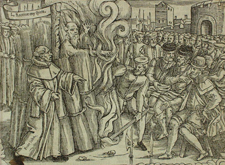by Peter Bolt
Four hundred and fifty years ago this year, Thomas Cranmer, the 67-year-old Archbishop of Canterbury, was taken through the north gate of the city of Oxford, tied to a pile of wood and burnt to death. It was one of those moments of horror for which that violent period is well known.
For the two hours prior to this, he had been forced to endure a mock trial in the church of St Mary the Virgin. The sentence had already been determined, after all the wood had been gathered and the time of execution had been announced throughout the city. The crowds were already building in anticipation. The trial itself was merely meant to be a piece of theatre. It would be used to show the congregation that even the old Archbishop recognised that his ideas had been heretical and in his last moments he was willing to renounce them all.
Yet the stage-managed trial had not quite gone as planned. It was true that in a moment of weakness Cranmer had signed a document recanting everything he had taught and written and had agreed to read the speech that had been given to him. But at the critical moment, when he was to tell the world that he and his friends had departed from the truth, the old Archbishop changed the words:
And now I come to the great thing that troubleth my conscience more than any other thing that ever I said or did in my life, and that is the setting abroad of writings contrary to the truth: which here now I renounce and refuse as things written with my hand contrary to the truth which I thought in my heart, and written for fear of death and to save my life if it might be; and that is, all such bills which I have written or signed with mine own hand since my degradation: wherein I have written many things untrue. And forasmuch as my hand offended in writing contrary to my heart, therefore my hand shall first be punished; for if I may come to the fire, it shall be first burned. And as for the Pope, I refuse him as Christ's enemy and anti-Christ, with all his false doctrine. And as for the Sacrament "
It is said that the church erupted in pandemonium at this point. What he said next could hardly be heard. The authorities had certainly already decided that he must die but there was certainly no way back now. He had used the opportunity they had unwittingly given him to turn his back on the documents he had signed and declare that he was committed to the very truths they were trying so desperately to stamp out, even if it sealed his fate.

Why? Why was it so important to that old man to make that stand and die like that? Why did he, as eyewitnesses testified, hold his right hand into the flames until he passed out from the pain? Why hadn't he, years before, left the country, like so many of his friends had done, in order that they might live and fight another day? Because, as far as Thomas Cranmer was concerned, his testimony to Jesus was worth dying for. The truth of the gospel was worth dying for.
People react in a variety of ways to the story of Thomas Cranmer. For some he is one of the great Reformation martyrs. His is the story of a hero"”courageous, tenacious, and dripping with integrity"”even if, under extreme pressure, there were those moments of weakness. They just make his final act of heroism all the more tangible, all the more human. But to others, Cranmer's story doesn't make much sense. What did his death achieve? Why push the point that far? Sure he might have been convinced of the things he was saying, but were they really worth dying for? Is anything really worth dying for?
Our world prefers its religion to be luke-warm. It's safer that way. It's less intrusive, less demanding. And so stories like that of Cranmer need to be explained away; respectfully, with as great a show of objectivity as possible, but explained away nevertheless. His stand made sense four hundred and fifty years ago. It makes little sense today. In the narrow-minded world just coming out of the middle ages, everything seemed so certain. But we
now know nothing is that certain. Religious zeal like that of Cranmer is just superstition in respectable dress. He and his contemporaries did not know it; but now, thanks to modern science and the great advances of technology, we can't be fooled anymore.
Blind and arrogant though that assessment is, it is even more concerning that many in our churches find a stand like that of Cranmer's a little weird as well. They can't imagine ever pushing the envelope that far. They see the wisdom in a longer term strategy, compromising a little now for the sake of a hearing later on. They distance themselves, just a little, from those the press loves to paint as extremists. Their advice to the controversialists amongst us would be, "tone it down a little'. This not the time or the place to make a last ditch stand.
Yet because Cranmer did not "tone it down a little', because he was prepared to die testifying that there is only one sacrifice that is effective in dealing with sin, only one priest who made it and only one altar upon which it was made, the light of the gospel was not extinguished in the English speaking world. Because he did not surrender to the pressure to cover up differences by the use of ambiguous language he left us a body of doctrine and a liturgy which sought to honour Christ rather than include "a range of perspectives'. 450 years later the heirs of Cranmer thank God for him and pray for the courage to follow his example.























